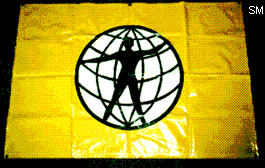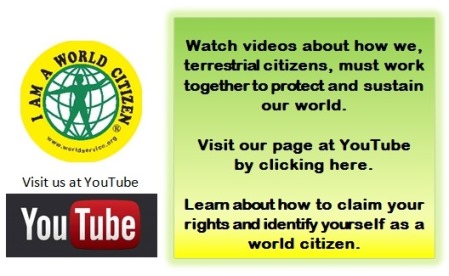World Citizenship Defined

The World Citizen Flag
The world...universally outgoing, conceptually unbounded, the planet dynamically, synergistically and organically one with itself and the cosmos.
Citizenship...the restrictive rights and duties within a given social structure.
The two words together seem paradoxical. "You can educate either the citizen or the man," wrote Thoreau. Yet in their union lies the potential success of the human species; in their non-union lies the demise of a fatally-flawed creature which could not overcome its self- imposed global anarchy.
This is the perennial mystery of the conceptual "joining" the perceptual. How and where does spirit indwell in the body?
World citizenship today implies the joining of the perennial wisdom of humankind with up-to-the-minute geo-political and geo-technical reality.
- Guru Nitya Chaitanya Yati, founder/head, East-West UniversityThe term 'world citizen' can be better understood with a negative definition than with a positive one. If a citizen of a state with political frontiers is expected to pay allegiance to the government of the state to which he or she belongs and is expected to take arms against aliens who might invade the territory of the state, a world citizen recognizes the entire world as one's state and in principle does not recognize any member of one's own species as an alien to the world community to which oneself belongs. Such a person recognizes the earth as one's sustaining parent, the innate inviolable laws of nature as one's protector, all sentient beings as one's brothers, sisters and kin, and the world without frontiers as one's home. The world citizen's allegiance is to the foundation of truth, the universality of knowledge and the fundamental ground of all values.
|
|
Before the industrial age and the electronic revolution, the identity and functioning boundary of social units was largely determined by the nation-state level and the mechanical barriers of geography. The workings of government and the writings of history were from non-global perspectives. Loyalty to the feudal prince, or later, to the sovereign king was direct, one-dimensional and absolute. Society was aural, its extent determined by the human voice. The development of the printing press and, in 1844, electronic informational transfer, established lines of communication from one relatively isolated social unit to another. A person's thoughts now could be known instantly from a distance. One did not have to know him or her personally. Indirect political representation was born. Inevitably the notion that the governed should have a voice in government became increasingly popular. Democracy, kindled in the context of rising expectations, inflamed revolution after revolution from east to west, north to south.
Yet here was born a tragic paradox: for the essence of democracy is universal participatory decision-making, whereas the essence of national sovereignty, a hangover from the feudalism and the absolute sovereignty of kings, is exclusivity and the non-participation of citizens outside the national boundary. Citizens "belonged" to the nation only while all humans outside that nation were "foreigners," or worse, "aliens."
This tragic contradiction begins to be socially instilled almost at birth. One is not born a human, or politically, a world citizen, but "French," "English," "American," "Russian," "Chinese," or "Iranian." One could add that all labels at birth--"black," "white," "Arab," "Jew," "Catholic," etc.--are essentially false contrasted with the reality of the human emerging from a human womb into the world of humans.
Personal qualities are simplistically attached to national (and other) labels rendering violence and aggression easy to justify by their leaders. We are "good," "noble," "best," etc. because we are "British," or "American," or "Russian." Others are ipso facto "bad," "ignoble," "inferior." Unlike us, they are threats to be feared, even killed.
Those who identified directly with the world of humans were considered starry-eyed idealists, utopians, sentimental humanitarians, impractical moralists, or simply crackpots. The only empirical world "citizens" were the pirates sailing freely on the open seas. They were the forerunners of the multinational corporations, the world "citizens" of the industrial world. The practical world, the world the 17th, 18th and 19th political power, was channeled into a framework based on unreality, the fiction of nationalism.
Then came the 20th century. Speed of transportation increased 100-fold in a few decades. Electricity and electronics linked the global surface eliminating time and distance implosively as barriers between humans leaving only divisive ideas, language and politics, the surrogate of religion. A new "vertical" dimension was added, which, if translated, was the element of reciprocal support, or universality and wholeness.
The world became literally overnight, historically speaking, one community, yet without overall management. The 17th, 18th, and 19th century sovereign state system, imposed by largely reactionary leaders, with notable exceptions, on the 20th century world of four major revolutions: technological, electronic, nuclear and space, proved and is proving daily to be totally inadequate to solve global human problems.
Indeed, the nation-centered way of "solving" problems is the major problem! The nation-state, by insisting on its absolute sovereignty, has become literally suicidal for the entire human species.
Today, with virtually no distance and no time between humans, each person is the focus of a global input. Everything happening in the world affects, sooner or later, each individual. With computers and satellites, the input to the individual has become fully supranational. Yet this irrefutable fact and its radical implications is popularly ignored.
A Middle East war raises the price of oil for everyone; an atomic bomb exploding in the South Pacific can mean leukemia for a baby born in Dayton, Ohio; dumping radio-active waste off the coast of Florida can mean radio-active fish caught by fishermen off the coast of Iceland, Great Britain, France or Spain; a shortwave radio placed anywhere on the surface of the globe receives a babble of voices--and ideas--from all corners of the world community.
Everything is happening at once and everything is happening to everybody. This is the most revolutionary fact of any century.
Yet what of the individual's output? Here, the reciprocal truth is, if possible, even less realized. If everything is happening directly to everyone, then every individual should be outputting directly to everything. This means simply that every individual should have the capability of direct democratic effect on the world-at-large. The world's individuals should constitute for themselves a global governing body to represent each individual as an outputting co-trustee of the earth as a whole.
The apt analogy is the human body itself. Each cell is linked to the whole by a nervous system directly connected to the human "computer," the brain. For this almost unbelievable coordinating mechanism to order the necessary action required by a specific threatening situation, there is instant feedback from hurt cells. The "government" operates on the basis of both individual and common good; thus it is"global," not "national" or "local" in character.
Government itself can be likened to the brain or the management mechanism by which the entire organism and each individual cell or unit can be fulfilled in terms of the triad of self, local community and the entire human community. The evolution of the computer today promises instantaneous input and output potential to each human and to all humanity, thus for the first time in history permitting world government and global institutions to take their rightful place in human institutions.
World citizenship, then, is the only dynamic and imperative political identity capable of relinking the conceptual or moral value of the human being with the social and economic organization of his/her now planetary community. It expresses both the innate and inalienable sovereignty of each human as well as the overall sovereignty of the human species to which he/she belongs, also innately and inalienably. Thus it fulfills at once the criteria for ethical as well as ethnical politics. Also, it connotes a plan of ongoing political action at all levels of social activity, local to global.
If indeed the nation-state has lost its legitimacy as a two-dimensional, horizontal, we-and-they, zero (or negative) sum political entity in a three-dimensional, positive-sum, "We-the-people-of-the-planet-earth" world, then so also has personal commitment to exclusive national citizenship. Just as no one sovereignty or group of sovereignties can directly prevent any other from unleashing a third inter-national war, so also can no amount of commitment to merely national leaders bring the world situation under control.
But just as national citizenship had to be taught, learned and experienced in former centuries, not without great turmoil to the social norms of the period, so world citizenship must now be taught, learned and experienced in this 21st century.
To think, feel and act globally is almost without precedent in our recorded history. Only rare prophets have managed to do so, but without the aid of modern science and technology. And so they were vilified and put to death. But now, faced with Armageddon, we must all become as prophets, for, as Buckminster Fuller put it, "Either war is obsolete, or (humans) are."
World citizenship is more than merely a political strategy. It "verticalizes" the individual raising him or her above the "left" and "right" of nationalistic politics, to meet and make functional the perennial value systems which heretofore have been only the subject of religious credence. This it complements and fulfills all religious prophecies and integrates at the same time the synergistic worlds of instantaneous communications, energy and ecology with political power systems and institutions.
The "Promise Land" of the Hebrews, the "Peace on earth," and"Thy will be done on earth..." of the Christians, the benevolent social order of the Moslems, the world fraternal order of the Sikhs, the "Middle Way" of the Buddhists, the "universal world order" of the Bah'a'is, all are contained in and can grow out of the multidimensional, human, spiritual/political dispensation of universal world citizenship.
There is no other pathway to the future...and to the stars.
